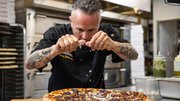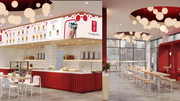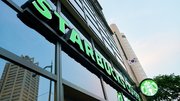News
Starbucks focuses on delivery
December 14, 2018
Delivery is a top priority at Starbucks, according to CEO Kevin Johnson and several of the chain's other leaders who discussed growth strategies during Thursday's investor conference in New York. The company will roll out Starbucks Delivers to nearly a quarter of its U.S. company-operated stores in early 2019, and has already reached 2,000 stores across 30 cities in China since launching three months ago. The success of China' delivery program inspired the chain to roll out pilots of Starbucks Delivers in both Tokyo and Miami with Uber Eats, according to a company press release.
While delivery will be a key driver of growth, the company also plans to expand its retail store portfolio by increasing net units by 6 to 7 percent and growing same-store sales by 3 to 4 percent, globally. The chain also reaffirmed its goals for 2019, and its long-term financial targets.
"As the undisputed category leader globally, Starbucks is well positioned to drive meaningful growth at scale, with more focus and discipline," Starbucks EVP and CFO Patrick Grismer told investors. "Today we reaffirmed our FY19 guidance and outlined our ongoing growth model. The transformative Global Coffee Alliance with Nestle will be accretive to non-GAAP EPS in FY20 and FY21, helping to deliver expected growth of at least 13 percent annually for those two years."
Longer term, Starbucks expects consolidated revenue growth of 7 to 9 percent and non-GAAP earnings per share growth of at least 10 percent. It intends to meet those targets with several growth initiatives, including:
- Unlocking new at-home and away-from-home coffee channels.
- Creating a more equitable and inclusive workforce by investing in partners.
- Creating meaningful customer connections.
- Accelerating growth in China through digital initiatives.
Unlocking new at-home and away-from-home coffee channels
Under the Global Coffee Alliance, Starbucks and Nestle are developing go-to-market strategies for the global rollout of Starbucks At-Home Coffee portfolio. Starbucks will be the only brand outside of Nestle to have branded products produced and packaged by Nestle on both the Nespresso and Dolce Gusto systems, according to the release.
Creating a more equitable and inclusive workforce by investing in partners
The company stressed how important its employees were to its success and said this year it offered access to backup child and adult care through Care.com and expanded paid sick leave and parental leave.
Over the last three years, Starbucks has:
- Hired over 21,000 Veterans and military spouses.
- Hired nearly 45,000 Opportunity Youth, which are young adults between the ages of 16 to 24 who were previously neither working nor in school.
- Set up more than 12,000 partners who are working toward a pathway to a college degree, including providing access to full college tuition coverage through the Starbucks College Achievement Plan (SCAP) with Arizona State University. These partners stay one-and-a-half times longer and are promoted at nearly three times the rate of their peers.
Creating meaningful customer connections
Throughout the conference, Starbucks leadership team emphasized its renewed focus on the customer experience and operational excellence. In the U.S., Starbucks COO Rosalind Brewer provided details on how the company is progressing against each of its operating initiatives:
- Enhancing the in-store experience.
- Delivering beverage innovation.
- Driving digital relationships.
1. Enhancing the in-store experience: Starbucks heritage is built on the "third place" experience where everyone is welcome and where customers can enjoy high-quality arabica coffee while they stay for moments of connection with each other and with Starbucks partners, Brewer said. Some of the key initiatives Starbucks is undertaking to create an even better experience for customers and partners include:
- Repurposing partners' time spent on administrative tasks to enhance customer engagement with the goal of improving capacity and throughput.
- Deploying technology to automate inventory planning and replenishment by improving the accuracy and efficiency of work routines.
- Optimizing the company's real estate footprint and store renovation strategy to deliver the next generation of the third place and drive higher financial return.
2. Delivering beverage innovation: As Starbucks drives more innovation in its stores while meeting consumer preferences, the company has seen the proven highly incremental results from Draft Nitro Cold Brew. Based on this success, Starbucks will roll out Nitro to all U.S. company-operated stores by the end of FY19 to meet customer demand for this growing platform.
3. Driving digital relationships: With digitally engaged customers purchasing two to three times as many products as those that are not digitally engaged, Starbucks continues to see significant promise in its digital initiatives as an enabler for customer convenience, awareness and value. To unlock further growth, the company announced three key areas of focus expected to drive 1 to 2 points of comp, including:
- New member acquisition and related spend lift.
- Further adoption of Mobile Order & Pay and the habituation it drives.
- Enhancements to the popular Starbucks Rewards loyalty program enabling customers to redeem for a variety of options and to earn rewards even faster.
Accelerating growth in China through digital initiatives
John Culver, Starbucks group president, International and Channel Development gave an update on the partnership in China with Alibaba Group. The collaboration across key businesses within the Alibaba ecosystem, including Ele.me, Hema, Tmall, Taobao and Alipay aims to enable an even more seamless Starbucks digital experience and transform the coffee industry in China, he said.
As part of this partnership, Starbucks opened a virtual Starbucks store in China. It provides customers with a one-touch digital Starbucks experience, using the Starbucks app and Alibaba's customer-facing mobile apps, including Taobao, Tmall and Alipay, according to the release.
The virtual store is brought-to-life by an online management hub, developed specifically for Starbucks by Alibaba, to integrate the company's digital experience offerings, including Starbucks Delivers, Say it with Starbucks social gifting and the Starbucks Tmall flagship store, onto one seamless interface for Starbucks customers and more than 600 million mobile monthly active users on Alibaba'ss China retail marketplaces.
 ChatGPT
ChatGPT Grok
Grok Perplexity
Perplexity Claude
Claude












